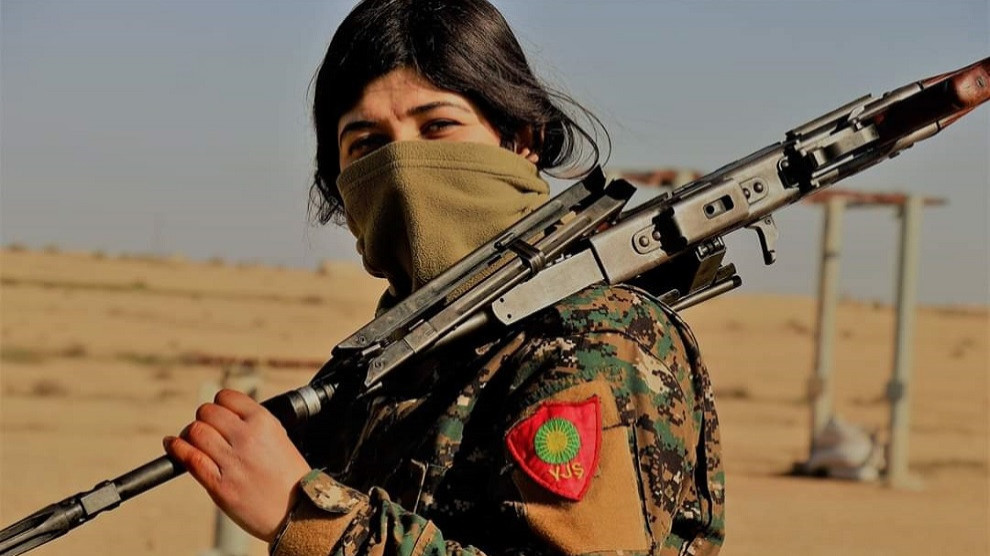The femicide and the resistance of Yazidi women
Thousands of Yazidi women from Shengal were abducted, raped, murdered and enslaved by the ISIS six years ago. In 2015 an armed women's unit was founded so that Yazidi women could defend themselves.
Thousands of Yazidi women from Shengal were abducted, raped, murdered and enslaved by the ISIS six years ago. In 2015 an armed women's unit was founded so that Yazidi women could defend themselves.

After the attack of the ISIS on Shengal (Sinjar) on August 3, 2014 an unprecedented femicide on Yazidi women began. Thousands of Yazidi women were kidnapped, raped, murdered and sold as slaves. Many of them committed suicide. Their children were used by the ISIS for suicide bombings.
In 2015, the Shengal Women's Units (YJŞ) were established as an armed defense force. The women's units participated in the front line of operations against the ISIS. Hundreds of Yazidi villages were liberated, and later thousands of abducted women.
On October 10, 2016, the offensive on Raqqa began, led by the YPJ and YJŞ. In the course of the offensive, 6,417 people were liberated, about half of whom were women and children. The liberated Yazidis and their children were handed over to Yazidi institutions in Rojava to be able to return to Shengal.
According to Seydo Ilyas of the Yazidi Centre, 144 women and 233 children from the Hol Camp in the canton of Hesekê have been returned to their families in Shengal. They had initially been housed in the camp during the SDF offensive against the ISIS in eastern Syria. Only later, in elaborate cooperation between the Yazidi institution and the camp administration, was it established that they were deportees from Shengal.
The Iraqi government did not support the Yazidis during all this time. Neither was the population protected from the ISIS, nor were efforts made to clear up the whereabouts of thousands of missing persons.
Activist Neteweyî Xemgîn witnessed the massacre in Shengal. "I was working in the Kurdistan Women's Organization at the time of the massacre. We tried to organize the women against the danger they were exposed to. Mosul and Tal Afar had already become ISIS centres. Shengal was under the control of the Iraqi government and the KDP", she reports about the situation at that time.
The Peshmerga did not fire a single bullet in defense of Shengal, says Neteweyî. The entire region was left to the ISIS within one day. The women's organisation appealed to all Kurdish parties after the attack, but only the leadership of Rojava and the PKK guerrillas felt addressed, Neteweyî said:
"The YPG and YPJ responded immediately. They called on South Kurdistan’s regional government to clear the way to Shengal, but the KDP did not allow it. It claimed to defend Shengal but it didn't do so. They wanted Shengal and its history to be wiped out. YPG/YPJ and the guerrillas fought against the ISIS together with the people of Shengal, even though they only had light weapons. They prevented the ISIS from taking Shengal."
The guerrillas and the YPG/YPJ fought to clear a corridor and ensured that the civilian population could flee to safe areas. Subsequently, the ISIS-occupied villages were gradually liberated. After the liberation, own defense forces were built up in Shengal within a short time. Civilian organization was also pushed forward, Neteweyî tells: "Institutions for the organization and education of the population were established. People's councils were established on the basis of Abdullah Öcalan's philosophy. The people of Shengal continue to fight to ensure that such massacres are not repeated. Thousands of Yazidi women who escaped from the ISIS took refuge in the mountains. They came back later and participated in the organizing work in Shengal."
Neteweyî Xemgîn demands that the Iraqi central government recognize the autonomous status for Shengal: "The Iraqi government is responsible for the thousands of abducted women who are still missing. Many women have suffered premature births and miscarriages while fleeing. There were women who hid their small children in the Shengal mountains so that they would not fall into the hands of the ISIS. The Iraqi government is responsible for them all. Turkey must also be held accountable for the crimes it has supported the ISIS."